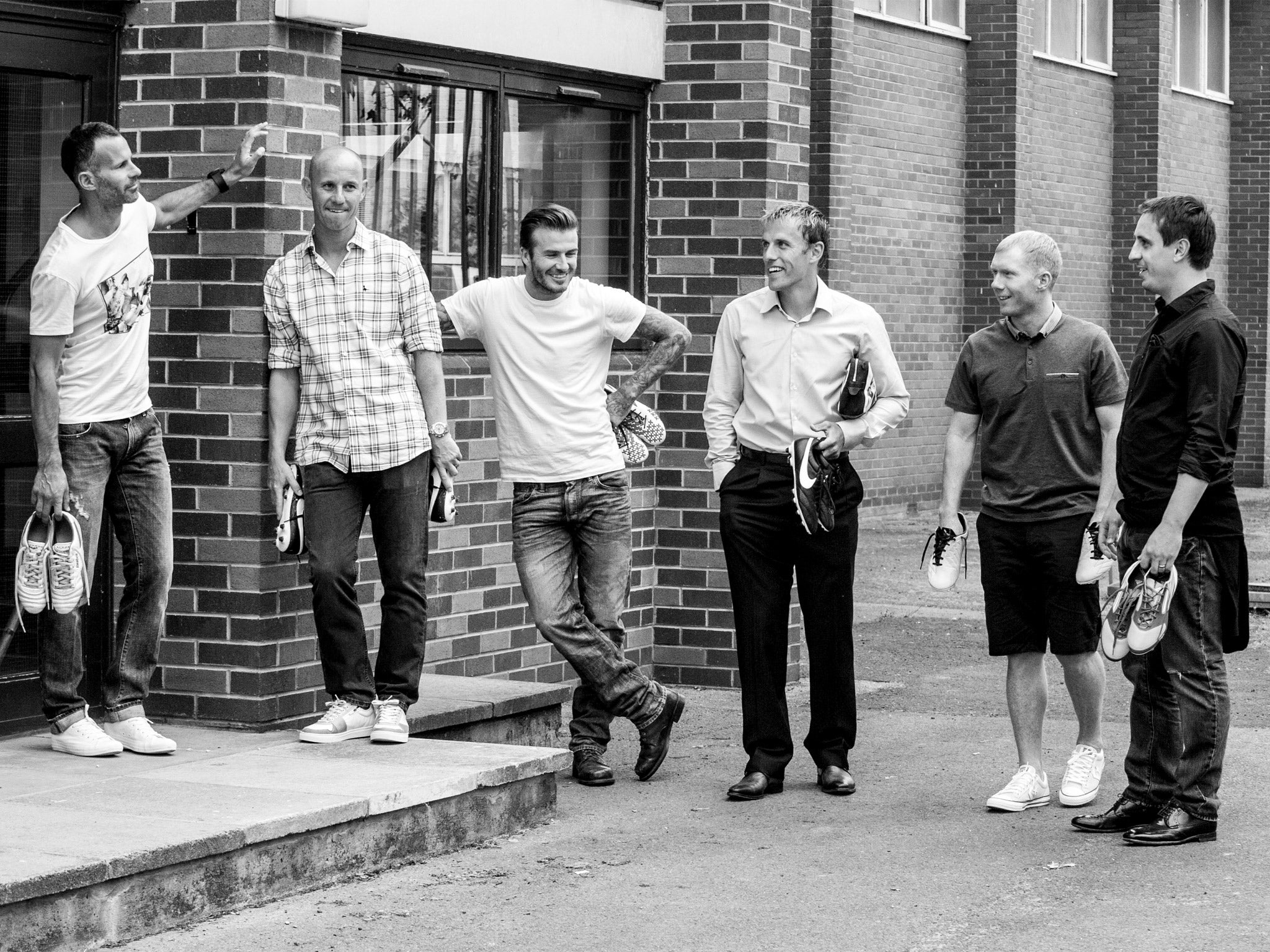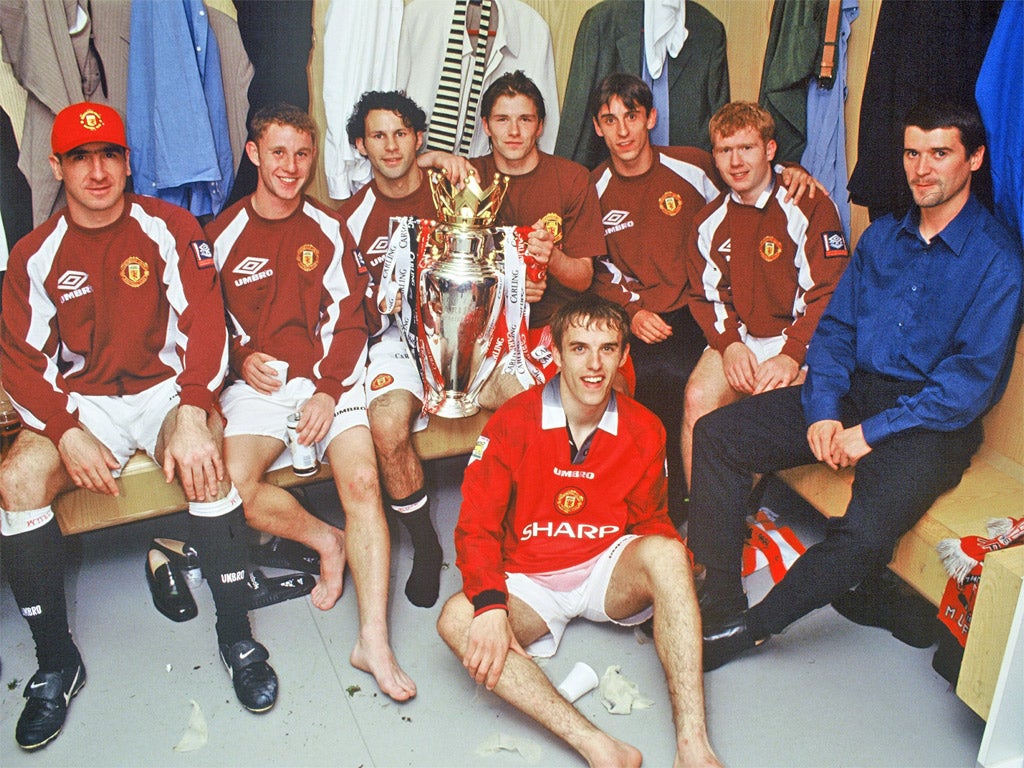The Class of 92: A new film tells the story of six young men who together would conquer the world with Manchester United
Sam Wallace talks to its makers about the great generation of Paul Scholes, Ryan Giggs, David Beckham, Nicky Butt and the Neville brothers, Gary and Phil

Your support helps us to tell the story
From reproductive rights to climate change to Big Tech, The Independent is on the ground when the story is developing. Whether it's investigating the financials of Elon Musk's pro-Trump PAC or producing our latest documentary, 'The A Word', which shines a light on the American women fighting for reproductive rights, we know how important it is to parse out the facts from the messaging.
At such a critical moment in US history, we need reporters on the ground. Your donation allows us to keep sending journalists to speak to both sides of the story.
The Independent is trusted by Americans across the entire political spectrum. And unlike many other quality news outlets, we choose not to lock Americans out of our reporting and analysis with paywalls. We believe quality journalism should be available to everyone, paid for by those who can afford it.
Your support makes all the difference.The director Gabe Turner, one of the two brothers who made The Class of 92, has a revealing story about Paul Scholes's debut in the movie business. The feature-length documentary is about the great Manchester United generation of Scholes, Ryan Giggs, David Beckham, Nicky Butt and the Neville brothers, Gary and Phil, and is released next month.
When Gabe and his brother Ben sat down to interview Scholes, recently retired for the second time and third on the club's all-time appearances list, the man himself had one major question.
Gabe takes up the story: "Paul said, 'Is this a movie then?' And we said, 'Yes'. 'Not television?' Paul said. 'No, Paul'. You could see him thinking. He said, 'Does that mean there'll be a premiere?' We were like, 'Yes, probably there'll be a premiere'. He said: 'Would I have to come to that?' We said: 'I'm sure we would want you to come to that. Would you like to?' 'No,' he said. 'Not massively'."
But it would be wrong to say that the Turner brothers, who made the excellent Laurie Cunningham documentary First Among Equals for ITV, found their subjects an awkward bunch. On the contrary, the five former United players – and one current – came to them with the idea for the film and embraced the process from start to finish. To the extent that one imagines they will be coercing Scholes up the red carpet come 1 December.
The film, made by the Turners for Universal, covers the seven years from 1992, when five of the group won the FA Youth Cup together (including Giggs, already a first-team player by then) and culminates seven years later with the Champions League triumph of 1999 that completed the famous Treble.
The project was, Gabe says, "the brainchild" of Gary Neville. He in turn was introduced to the Turner brothers by a mutual acquaintance, Dave Gardner, who is a friend and contemporary of the players. It was shot during the summer with all six of the key protagonists together in one place for just one day – necessitating a lot of hard work and, as Gabe says, "making a movie on a TV shooting schedule".
There are contributions from others in the 1992 FA Youth Cup-winning team, including Robbie Savage, and others who did not go on to have pro careers in football like George Switzer, Andy Noone and Raphael Burke, originally regarded as the most talented of the lot. Ben Thornley was unable to make the date and Keith Gillespie just could not be tracked down at the time.
But essentially this is a story about the six who did make it. When they brought them all together at The Cliff, United's former first-team training ground in Salford, the Turners were struck by just how much they still love to play football. "Give them a ball and they are happy," Ben says, "I don't think they have lost any of that enjoyment from when they were kids playing together."
Central to the project was the social context to the story, an element that is critical to the Turner brothers' work. As with the Cunningham documentary, and its examination of attitudes towards race in Britain in the 1970s and 1980s, in making The Class of 92 they wanted to encompass the mood of 1990s Britain.
The six talking heads in the documentary were chosen carefully. From a football perspective they have Zinedine Zidane and Eric Cantona. Eric Harrison, the coach of the 1992 youth team, is another. Gary "Mani" Mounfield from The Stone Roses and the film director Danny Boyle provide a take on popular culture. It is the sixth person that grabs the attention: Tony Blair. He was first elected prime minister in the same month the new United generation won their second Premier League title together.
"We knew Blair would be the one people would be interested in," Gabe says. "We are not in the realm of making political documentaries. These boys were part of the massive revolution in the country at the time, with this feelgood factor. We felt that whatever people think of Tony Blair now, if you are telling the story of early 1990s culture his is one of the most interesting perspectives to get.
"He was at the centre of it. In those days you had people like Noel Gallagher at the Brit Awards saying everyone should love Tony Blair. There was a very different landscape. He was sort of the nation's darling. We felt it was more important to tell that period authentically."
There is, however, no contribution to the documentary from Sir Alex Ferguson. "To be honest, we didn't really think about it too much," Gabe says. "It was all about Fergie when we landed the film [with his retirement at the end of last season]. It was nice just to have the boys tell their story. He is such a voice that he would potentially dominate it."

From the outside, one of the key problems would surely be telling a story that is so well entrenched in public consciousness in a way that is different. After all, four of the six have released autobiographies in the last 10 years. Yet the Turners are confident "there is stuff in there that people haven't heard before".
"You get a different aspect from seeing them together," Ben says. "Our worry going into it was that they had such a lot of media training to say nothing in interviews and be really cagey. What was amazing was that they were very, very open and trusting. You get a totally different personality from them. I have never seen them in this way before. That's really fresh."
Gabe adds: "We have built it around the 'moments', as with the best sports documentaries in America. It culminates with the 1999 Champions League final. Watching that through their eyes, with them talking you through it, is proper hair-standing-up-on-the-back-of-the-neck territory.
"You get a really warm sense that these are six ordinary dudes who achieved something incredible but haven't lost that humility. They are just good blokes. When we have shown the movie to people they say 'Oh, I remember that'. It is something about the way these guys arrived in the public eye which is really evocative of anyone who grew up in that period."
Strictly speaking, Phil Neville, born in 1977, was not part of the 1992 generation, although he played in the 1993 team that lost the FA Youth Cup final to Leeds United and broke into the Manchester United first team around the same time as the others. And clearly, in terms of global fame none of them get close to Beckham.
"David Beckham was probably the easiest to deal with," Gabe says. "The man is a complete legend. One of our runners came up on the night of the shoot with a smile on his face. I asked him what had happened. He said he was working away behind the scenes and when we had finished shooting Beckham walked up to him and said, 'Do you want me to get you a beer?'
"Sometimes in our world people don't talk to the runners or there is a bit of a hierarchy but he was absolutely lovely with people. It sounds gushing but they were such good blokes to hang out with and talk to."
The film, they believe, will show the six as they have never been seen before – especially Butt, now Under-19s coach at United. "Working with them you see that Nicky was to some degree their Bryan Robson," Gabe says, "their leader."
Younger than their subjects, Ben, 36, and Gabe, 32, are London-raised but Sunderland fans. Their production company Fulwell 73 is named after the Fulwell End at Roker Park and the year of Sunderland's last FA Cup triumph. They are working on a biopic of the Cunningham story with an inspired bit of casting in the offing: James Corden as the Ron Atkinson of the 1970s .
It was talking to Butt about the medals he had won that brought home the success that the "Class of 92" achieved. "Nicky was saying, I've won three FA Cups. Or is it four?'" Ben says. "And we were thinking, 'We support a club that last won something in 1973!' They won so much and they were instrumental in making the Premier League what it is now."
The Class of 92: Key contributors
Zinedine Zidane
Three-time Fifa World Player of the Year, in the Juventus team that lost to United in the 1999 Champions League semi-finals before his world-record transfer to Real Madrid. Once described Paul Scholes as "almost untouchable in what he does".
Eric Cantona
The guiding light of the first Premier League title-winning United teams in 1993 and 1994. Retired from football in 1997 but his work ethic and perfectionism had a long-lasting impact on the Class of 92.
Eric Harrison
United's youth-team coach and a prodigious developer of talent for Sir Alex Ferguson's senior team before his retirement in 2004 . A gruff Yorkshireman who was notoriously hard on his charges but got results, including successive FA Youth Cup finals in 1992 and 1993.
Danny Boyle
Lancashire-born United fan who began making his name as a film director in the 1990s, first with Shallow Grave and then the seminal Trainspotting in 1996. Went on to direct dazzling opening ceremony for London 2012 Olympics
Gary "Mani" Mounfield
"Mani from the Stone Roses", the bassist and United fan whose band provided the soundtrack to Britain in the early 1990s, splitting in 1996. Mani went on to join Primal Scream before the Roses reformed in 2012 to play a series of special concerts.
Tony Blair
Became Labour leader in 1994 and elected prime minister for the first time in 1997. Unlike previous Tory prime ministers, recognised the power of football. Ferguson revealed he asked him for advice about how to deal with Gordon Brown.
Where are they now?
Ryan Giggs
The only one still playing, having won 13 Premier League titles. He turns 40 this month.
Nicky Butt
The first to leave, in 2004. Now coaching United's Under-19s.
David Beckham
Retired this summer at 37 after a spell with Paris St-Germain; one of the globally mega- famous.
Phil Neville
Retired in May to join David Moyes's staff at United, having spent eight years at Everton.
Paul Scholes
Retired for a second time this summer. Now likely to coach at United.
Gary Neville
Came up with the idea for "The Class of 92" movie. Now the nation's favourite TV pundit.
Join our commenting forum
Join thought-provoking conversations, follow other Independent readers and see their replies
Comments